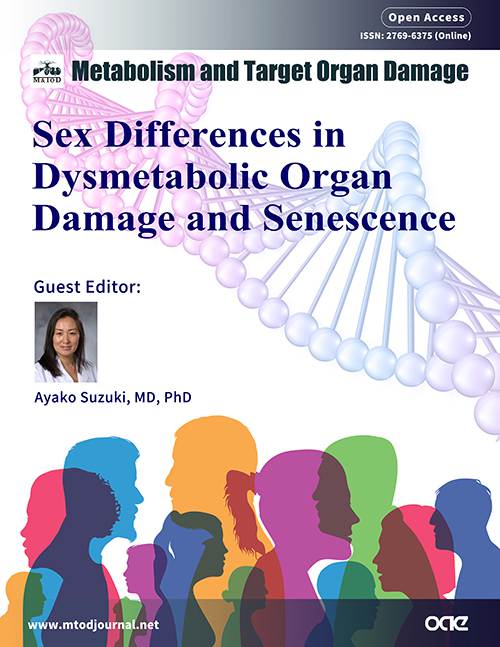
Topic: Sex Differences in Dysmetabolic Organ Damage and Senescence
A Special Issue of Metabolism and Target Organ Damage
ISSN 2769-6375 (Online)
Submission deadline: 30 Jun 2024
Guest Editor(s)
Special Issue Introduction
Owing to the obesity epidemic, obesity-related organ damage became a leading health concern across the continents. The prevalence of obesity continues raising globally, even among children and adolescents. In parallel, type 2 diabetes, arterial hypertension, dyslipidemia, cardiovascular disease, nonalcoholic fatty liver disease, and chronic kidney disease (i.e., dysmetabolic organ damage) also continue to rise, significantly impacting society and the healthcare system. Chronic excess energy accumulation in the body system induces systemic cellular metabolic stress, dyshomeostasis, and premature cell/tissue senescence, resulting in declined systemic functional reserve, multiple comorbid conditions, and poor quality of life (QOL). Biological variations in cellular homeostasis and stress response, cell death, immune regulation, and tissue repair and remodeling likely contribute to the development and severity of dysmetabolic organ damage. Increasing evidence suggests that pathways involved in these processes are all regulated by sex hormones and differ significantly in males and females.
Delineating disparities by sex, gender, and reproductive status and their clinical implications is crucial to establishing an approach toward precision medicine in metabolic disorders and improving long-term health outcomes and QOL in this obesity pandemic. This Special Issue broadly calls for original and review articles addressing disparities by sex, reproductive status, and reproductive health in dysmetabolic organ damage, premature aging, and declining functional reserve. We welcome experimental, translational, clinical, epidemiological, and computational modeling studies, artificial intelligence works using animal data, or electronic health records to this Special Issue, including but not limited to:
1. Sex differences in organ damage, senescence, and functional reserve and complications (including tumorigenesis);
a. The impact of menopause, hypogonadism, polycystic ovary syndrome, premature ovarian failure, and synthetic hormone use – mechanistic as well as epidemiological approaches.
b. Sex-specific role of immune responses/inflammation in organ damage throughout the lifecycle.
2. Sex differences in tissue repair/regeneration, specifically addressing sex differences and sex hormone regulation in tissue repair/remodeling;
3. Sex-specific therapeutic approaches (diets, exercise, supplements, and pharmaceuticals) or sex differences in treatment responses includes but is not limited to NAFLD, endothelial dysfunction, muscles, cardiovascular disease, and kidney disease;
etc.
2. Youngmi Jung, Department of Biological Sciences, College of Natural Science, Pusan National University, Pusan, South Korea.
3. Bharti Manwani, Department of Neurology and Neuroscience, University of Texas, Houston, TX, USA.
4. Puja K. Mehta, Division of Cardiology, Emory Women's Heart Center, Emory University School of Medicine, Atlanta, GA, USA.
5. Jun Wang, Department of Population and Public Health Sciences, University of Southern California, Los Angeles, USA.
Delineating disparities by sex, gender, and reproductive status and their clinical implications is crucial to establishing an approach toward precision medicine in metabolic disorders and improving long-term health outcomes and QOL in this obesity pandemic. This Special Issue broadly calls for original and review articles addressing disparities by sex, reproductive status, and reproductive health in dysmetabolic organ damage, premature aging, and declining functional reserve. We welcome experimental, translational, clinical, epidemiological, and computational modeling studies, artificial intelligence works using animal data, or electronic health records to this Special Issue, including but not limited to:
1. Sex differences in organ damage, senescence, and functional reserve and complications (including tumorigenesis);
a. The impact of menopause, hypogonadism, polycystic ovary syndrome, premature ovarian failure, and synthetic hormone use – mechanistic as well as epidemiological approaches.
b. Sex-specific role of immune responses/inflammation in organ damage throughout the lifecycle.
2. Sex differences in tissue repair/regeneration, specifically addressing sex differences and sex hormone regulation in tissue repair/remodeling;
3. Sex-specific therapeutic approaches (diets, exercise, supplements, and pharmaceuticals) or sex differences in treatment responses includes but is not limited to NAFLD, endothelial dysfunction, muscles, cardiovascular disease, and kidney disease;
etc.
Participants
1. Anna Mae Diehl, Division of Gastroenterology, Duke University Medical Center, Durham, North Carolina, USA.2. Youngmi Jung, Department of Biological Sciences, College of Natural Science, Pusan National University, Pusan, South Korea.
3. Bharti Manwani, Department of Neurology and Neuroscience, University of Texas, Houston, TX, USA.
4. Puja K. Mehta, Division of Cardiology, Emory Women's Heart Center, Emory University School of Medicine, Atlanta, GA, USA.
5. Jun Wang, Department of Population and Public Health Sciences, University of Southern California, Los Angeles, USA.
Submission Deadline
30 Jun 2024
Submission Information
For Author Instructions, please refer to https://www.oaepublish.com/mtod/author_instructions
For Online Submission, please login at https://oaemesas.com/login?JournalId=mtod&SpecialIssueId=mtod220309
Submission Deadline: 30 Jun 2024
Contacts: Doreen Deng, Managing Editor, editorialoffice@mtodjournal.net
Jimmy Yin, Science Editor, jimmy@mtodjournal.net






